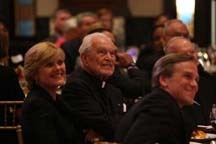
WASHINGTON – To the secretary of state, he is a towering historical figure who nevertheless possesses a deeply personal, deeply spiritual touch.
To a former U.S. senator, he is a man who always has been called on to do the hard jobs for his country on issues fraught withguilt, fear, emotion and racismand who always managed tobring reason to the fore.
To a much younger priest in the Congregation ofHoly Cross, he is the giant who, after a lengthy conversation covering many of the episodes of his astonishingly accomplished life, knelt down before the younger man, his religious superior, and asked his blessing.
Amid the majesty of the Great Hall in the Smithsonian Institutions Donald W. Reynolds Center for American Art and Portraiture, an audience of more than 250 family members, friends and comrades in battles for civil rights and a host of other causes paid tribute Tuesday night to Rev. Theodore M. Hesburgh, C.S.C., the University of Notre Dames president from 1952 to 1987.
The event featured the inclusion of a photograph of Father Hesburgh into the permanent collection of the National Portrait Gallery. The image, by an unidentified photographer, captures Father Hesburgh and the Rev. Martin Luther King Jr. linking hands in solidarity during a civil rights rally at Soldier Field in Chicago in 1964. Work in support of civil rights, marked most prominently by his service on the U.S. Commission on Civil Rights, was among the many major national and international issues in which Father Hesburgh was involved.
The guest list included numerous current and former members of Congress, including the Speaker of the House of Representatives, Nancy Pelosi, as well as many Notre Dame trustees, advisory council members and friends of the University.
U.S. Secretary of State Condoleezza Rice, who received her masters degree from Notre Dame in 1975, spoke at a reception before the formal dinner about her association with Father Hesburgh. It began, she said, when she was 14 or 15 years old and Father Hesburgh came with other members of the civil rights commission to the University of Denver at the invitation of Rices father, who was teaching a course there on the black experience in America.
Father Hesburgh spoke there about the greatwoundin American life that was racism, and about thehealingthat was taking place then through the civil rights movement and the enactment of civil rights legislation.
Rice said Father Hesburgh and her father, John W. Rice, becamegood friendsas a result of that encounter – good enough that her father felt comfortable sending her to Notre Dame for graduate schoolbecause he knew (she) would be under the watchful eye of Father Ted.
She recalled two letters that she had received over the years from Father Hesburgh. In one of them, on the occasion of her fathers death, Father Hesburgh offered the assurance that her father was even then in heaven. In the second, much more recently, he wished her well in the difficult tasks she faced as secretary of state and urged her, in moments of trial, to utter his favorite prayer:Come, Holy Spirit.
In a speech marked by great humor and deep appreciation, Alan Simpson, the lanky former senator from Wyoming, recalled his work with Father Hesburgh in 1980 on the Select Commission on Immigration and Refugee Policy.
They never gave him any of the soft jobs to do for his country,Simpson said. Father Hesburgh always got the jobs in whichguilt, fear, emotion and racismran riot. But the priest, he said, always found a way tobring reason to the fore.
Simpson recalled a favorite Hesburgh expression about forgiveness:If you cant forgive a person, its like letting them live in your head rent-free.
Notre Dame’s current president, Rev. John I. Jenkins, C.S.C., recalled when he was religious superior of the Congregation of Holy Cross in 1997 and he met with each member of the order, including Father Hesburgh.
The two men talked at length about Hesburghs remarkable life and achievements, Father Jenkins said, and then Hesburgh knelt before him and asked the younger mans blessing. It was, Father Jenkins said, a true reflection of the mans greatness as a person and a priest.
Father Hesburgh himself responded to the adulation with an Italian expression that he translated as,It may not all be true, but it sure sounds good.
Speaking seriously, he said,When you boil it all down, each one of us has to say that God has been awfully good to us.
Among the divine gifts, he said, are intelligence, which makes us unique among Gods creatures, and family – not just of blood, but also of spirit. The room, he said, was full of peoplewho would literally die for each other.
We thank God,he said,for the grace of living in these times, times when good could be achieved and when beauty was always there if you looked hard enough for it.
TopicID: 24926